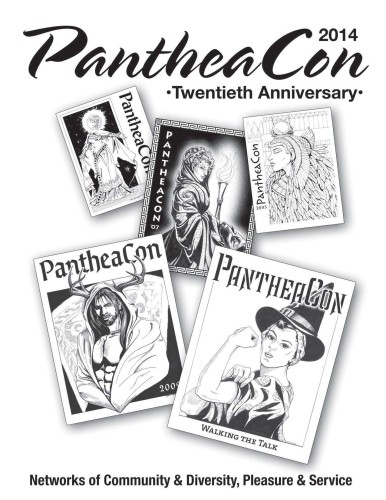Pilgrimage as a part of spiritual growth is not a new concept. Religions and cultures throughout time have regarded travel to specific locations as a means of spiritual enlightenment and fulfillment. Traditional pilgrimages to destinations like Stonehenge, Mecca, Haiti, and other spiritually significant locations have depended mostly on the beliefs of specific religious paths. In her article, What is a Spiritual Pilgrimage? Nikki Jardin states “A spiritual pilgrimage is a physical journey toward a place of sacred or religious significance.” This definition fits with how many Pagans, Wiccans, and Polytheists have come to revere Pagan conventions and festivals: As yearly spiritual pilgrimages for transcendent and communal enlightenment.
 This past weekend, PantheaCon turned 20 years old. This California-based convention pulls approximately 2,500 Pagans every year to San Jose, California to enjoy music, rituals, lectures, panels, great conversation and connection among a wealth of magical practitioners. This convention-style event is the largest of its kind within the United States, and has become a yearly attraction for people of various different levels of practice within this broad community of Pagans. While PantheaCon offers a plethora of experiences that can equate to spiritual connectivity — an important concept within a community of practitioners that are often separated by paths, traditions, and variations of time and space — opportunities to engage in activities that fall into categories of political discussion, social engagement, entertainment, and religious rites, bring a wide variety of people in touch with others in unique ways.
This past weekend, PantheaCon turned 20 years old. This California-based convention pulls approximately 2,500 Pagans every year to San Jose, California to enjoy music, rituals, lectures, panels, great conversation and connection among a wealth of magical practitioners. This convention-style event is the largest of its kind within the United States, and has become a yearly attraction for people of various different levels of practice within this broad community of Pagans. While PantheaCon offers a plethora of experiences that can equate to spiritual connectivity — an important concept within a community of practitioners that are often separated by paths, traditions, and variations of time and space — opportunities to engage in activities that fall into categories of political discussion, social engagement, entertainment, and religious rites, bring a wide variety of people in touch with others in unique ways.
The journey of PantheaCon is often filled with months of planning, saving, and preparation, ending in an experience that promotes alignment with spiritual energy, beliefs, and practice. The idea of pilgrimage would imply that this time and space encourages these very things, leaving us with some knowledge that could clarify why several thousand people insist on coming to this yearly event, regardless of where they live within the United States or the cost involved.
Tim Titus
“PantheaCon is like the Need Fire, that legendary bonfire that would be lit by a community at a magical time. Each member would take a spark home to light their own hearths and sustain them for the coming year. Going to PantheaCon lights a spark for me that sustains me throughout the year. The spark is intellectual: I have a catalog of new spiritual ideas to contemplate. It’s emotional: I renew connections with people I love. It’s energetic: I feel renewed with excitement about my life and my craft. It’s physical: Plenty of hugs, dancing, and indulgence. Making the pilgrimage to PantheaCon sustains and renews my spiritual practice on every level.” – Tim Titus, Blogger at Intersections
Lisa Spiral Besnett
“PantheaCon as a spiritual pilgrimage. What a great idea! It’s certainly a pilgrimage for me. I come to San Jose from Minnesota so the planning and logistics are a little more complicated than for a drive up the coast. Furthermore, I have a son with special needs who must have support in my absence. This makes planning and logistics truly epic — a pilgrimage indeed.
The reasons I go to PantheaCon are spiritual. I get to reconnect with my heart friends in the community. I get to expand on my spiritual knowledge base. I get to share my insights and challenge my own beliefs. But there are also other reasons to go. I’m an author and this year I had an opportunity to present a workshop. PantheaCon is, at least in terms of justifying the expense, a business trip.
Ironically, the workshop I presented this year was about daily practice. I talked for an hour about incorporating spiritual practice into everyday life. Still, I must confess, it never occurred to me to approach this event in the context of a spiritual pilgrimage. There is always something new to learn in connection with this event! This was my third year at PantheaCon, and I hope to come again. I know that I will shift my attitude as I make preparations for next year. I’m interested and excited to see how approaching this event as a spiritual pilgrimage will change my experience.” – Lisa Spiral Besnett, Author
Brenda Titus
“Much of my spiritual practice throughout the year is on my own or in varying small groups. When I come to PantheaCon, it helps me take that personal, intimate work, turn the volume up on it, and make it more powerful and impactful. I think about it similarly to how I think about celebrating a birthday or a holiday…. It is one thing to celebrate on my own, it is another to celebrate with my immediate family. As I extend it out to my entire extended family, friends, and community, that power and intensity grows. Tapping into that power, that intensity, opens my heart to the Divine in a way that far surpasses what I am able to do on my own. It refuels me for the coming year, reconnects me to my life’s purpose, so that I can return to my intimate community to share how I have learned and grown, ultimately aiding their growth.” – Brenda Titus, Hypnotherapist
Devin Hunter
“In modern paganism our temples don’t always get to stand erect 24/7. Festivals like PantheaCon act as centers for cultural and spiritual exchange and for many pagans hold the same value and place as the temples of our spiritual ancestors. In the same way our predecessors made pilgrimage (and many still do) to these sacred sites, modern pagans make their way to events like PantheaCon. I find that PantheaCon is quite addictive for the communal Pagan. The most spiritual part of it is the exchange of ideas, theology, mystery as well as the sharing of those experiences. We are all made richer by communal exploration and discussion. I find myself returning each year to drink deeply from the well of gnosis that is contemporary paganism.
I have grown to really appreciate how PantheaCon has become part of not just my own spiritual practice but the practice of my tradition as well. It is an excellent resource when training students and has been a truly hands-on atmosphere where we get to lead rituals, teach and attend workshops all as a tradition. Afterwards we discuss how our experience can inform our practice and have found the convention to be quite educational all around.” – Devin Hunter, Modern Witch Podcast and Magazine
Elysia Gallo
“Well, using the definition of pilgrimage as a journey to a special, unusual or sacred place, I would say no; there is nothing special or holy about the DoubleTree Hilton hotel. But if we view pilgrimage as a spiritual quest to connect with something divine, and we see others in our community as divine, then yes, it is a pilgrimage of sorts. Now, I see Pagans quite regularly under different circumstances, but why PantheaCon is important to me is for that sense of reconnection, both to the friends that I only see here once a year, and reconnecting to why this whole thing (publishing Pagan books, working with Pagan authors, volunteering in the Pagan community) is important to me personally. I gain so much fresh inspiration and energy each year, I don’t think I could do my job without diving headlong into that current, immersing myself in it the way we do at PantheaCon, at least once a year. It definitely reminds me what’s important and encourages me to strive even more.” – Elysia Gallo, Llewelyn Worldwide
“PantheaCon is a social networking paradise for me. I’ve experienced it as the one time of year my net gets wider with more friendships added to the fold. I’ve met fellow Pagans who I’ll be in contact with for life. I return for the Pagan family reunion, because there are a lot of people whom I will only get to see at PantheaCon. I also come to do work for special causes within the Pagan community. These two things alone make it all worth it to me.
With all the bustle and noise during the convention, my spirituality focus tends to get a little distracted. When I leave from PantheaCon, I get to practice the newfound boundaries and expansion of my spirituality that I took away.” – Aine
Interestingly, all the people asked to contribute to this piece found some special value in the experience of convention, enough to continue to return year after year. On his blog Intersections, Tim Titus wrote about his PantheaCon experience this year in the piece, PantheaCon; Stars Among Stars. Titus clearly illustrates the epitome of the importance of PantheaCon by stating, “As Aleister Crowley wrote, we are all stars. But we are not isolated. Stars exist in galaxies of other stars. They are independent bodies, yet constantly interacting with each other. That’s exactly my experience of PantheaCon: we are all stars in the company of stars. We are individual; we are one with each other. We follow our own paths in life and at the convention, but we interact with each other and are interdependent within the entire body of PantheaCon. Individual, yet connected, we never know how much something we do can influence someone else we have never met.”
In my experience of the various ways that people immerse themselves in and enjoy this convention, I would say that Titus hit the nail on the head. PantheaCon is an accumulation of hallowed experiences and connections that create an outcome of spiritual exploration within the walls of the DoubleTree Hotel, in a city called San Jose.
According to Beliefnet.com, there are 10 tips for performing a spiritual pilgrimage: “choose your location, declare your intention to go, prepare physically, prepare mentally, inform your friends and family, keep realistic expectation of your journey, give yourself up to the pilgrimage, deal with reality upon your return, keep the momentum going — in moderation, and revisit your pilgrimage from home.” All of these steps are ones that many of us go through to enjoy the four-day event, leaving me to believe there might actually be something to the idea that conventions and festivals might be the closest thing to community-wide spiritual pilgrimages within the Pagan community.
The Wild Hunt is not responsible for links to external content.
To join a conversation on this post:
Visit our The Wild Hunt subreddit! Point your favorite browser to https://www.reddit.com/r/The_Wild_Hunt_News/, then click “JOIN”. Make sure to click the bell, too, to be notified of new articles posted to our subreddit.






Really interesting post. I hadn’t thought of conferences this way, but it makes sense. I’m looking forward to Sacred Space in a few weeks. Also makes me think of Barbara Ehrenreich’s Dancing in the Streets: A History of Collective Joy, which, IMHO, every Pagan should read.
Totally off topic: Has Alley Valkerie seen this (or was she involved in it)? http://www.yesmagazine.org/new-economy/tiny-house-villages-for-the-homeless-an-affordable-solution-catches-on?ica=Tweet&icl=ShareBar_Art_UR
Wow! Thanks for posting that! I was involved, but hadn’t seen this article. I was part of the original task force who conceived of and pushed for Opportunity Village, and spent well over a year battling the City with along countless others in order to gain permission and space for the project. Once permission was granted, I put space between myself and the Village folks for political reasons (good cop/bad cop goes a long way in this town), but I’m still involved on the outskirts and I’m thrilled that its success is being replicated.
And I also completely agree with you about the Ehrenreich book… should be mandatory reading for Pagans.
I can see how conferences fulfill this function, but I can also see how they have the effect of winnowing out those who can afford to make the pilgrimage from those who cannot. I would be interested in finding out if the organizers and the communities that arise out of this shared sense of pilgrimage could try to create a means of bringing more people to the event and work together to make them more affordable. I suppose that this was part of the reason that a trip to Mecca for Muslims can only be made by someone without debt, and, having put on events myself, I know how expensive they are to produce.
I strongly agree with this. There’s been lots of talk about privilege in the pagan community lately, but economic privilege is one we don’t really like to go near. As someone who would never be able to attend P-con but for the fact that I can vend there to pay my way, I’m real sensitive to this issue. I also see a interesting side of it as a vendor, because I inevitably end up in conversations with a lot of people about money, usually in the context of what they can and cannot afford. In my observations (and this is just my opinion, please hold your fire) Pagans have a very unique (not accurate, but quite unique) understanding of what it means to be “poor” and “broke” that in many ways is even more divorced from reality than the average American’s understandings about these issues.
I think this is an area we really need to work on as a community. I would love to see scholarships to events like P-con for low-income folks, and possibly financial help with things like the hotel room as well. P-con may be inclusive to all Pagan traditions, but its definitely not economically inclusive.
It’s like the Doubletree San Jose becomes a temporary pilgrimage place (kind of like the TAZ).